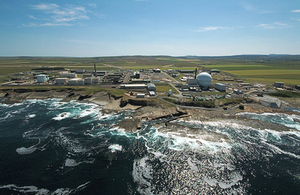Hazardous liquid waste cementation reaches milestone
The last batch of higher activity liquid waste produced during Dounreay’s Materials Test Reactor (MTR) research reactor has been cemented into a drum.

Hazardous liquid waste cementation reaches milestone
It is an important milestone in the processing of the historic liquid waste created during the operation of Dounreay’s three reactors.
Between 1958 and 1966, 13,000 Materials Test Reactor (MTR) fuel elements were reprocessed at Dounreay, including fuel from other reactors in the UK and abroad.
The spent fuel was dissolved in acid and the re-usable fuel separated from the waste fission products, with the acidic liquor containing the waste, known as raffinate, being held in underground storage tanks in the neighbouring facility known as D1208. The Dounreay Cement Plant (DCP) has been in operation since 1996 processing the MTR raffinate.
Batches of liquor were remotely transferred from the underground tanks in D1208 to DCP, where it was neutralised and mixed with cement powder inside 500-litre drums in a remote handling process, making it passively safe for long-term storage or disposal.
The result is nearly five thousand drums of solid waste, which will be stored above ground in accordance with the Scottish Government’s Highly Active Waste policy of on surface or near surface storage.
DSRL waste director Charlie McVay said:
The D1208/DCP teams have done a great job in safely and ahead of schedule processing the MTR raffinate.
The team’s innovative use of nitric acid to dissolve the solids and overcoming other operational issues is to be commended.
The team is now working to make the necessary modifications to begin processing DFR raffinate next year.
Senior project manager George Sinclair, who oversees the work at the two facilities, said:
The completion of MTR raffinate immobilisation brings an end to an era of challenging and pioneering work at Dounreay.
The team of people, both past and present, who have contributed to the success of the process plants are to be commended for their dedication and skill in operating the facilities in a safe and effective manner.
The NDA’s director of programme for Dounreay, Nigel Lowe said:
The important thing about this achievement was the production of a consistent waste disposal product that meets with national and international quality standards given the complex nature of the radioactive wastes involved. It is another example of the leading work being carried out at Dounreay.
DCP will now be prepared to deal with the DFR raffinate currently stored in underground tanks at D1208, which is expected to start being processed in March 2014.